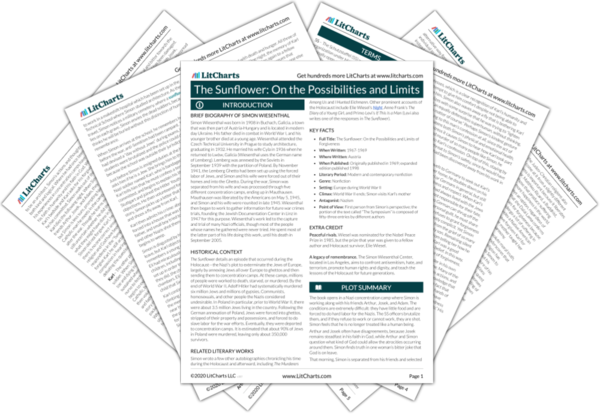Though the book presents a variety of different perspectives regarding whether Simon should or should not forgive Karl, almost everyone agrees about one thing: there is a moral imperative not to forget the crimes of the Holocaust, in order to make sure they never happen again.
Many of those who argue against forgiveness do so with the argument that forgiveness will lead to forgetting and possibly repeating the atrocities that have occurred. Sven Alkalaj argues that forgetting the crimes is worse than forgiving the criminal because it devalue the humanity of the people who perished. Moshe Bejski and Manès Sperber have similar arguments: forgiveness cannot actually occur without, in some way, forgetting the atrocities, which is why they refuse to acknowledge forgiveness as an option. Bejski, in particular, also brings up the idea that there should be no statute of limitations on crimes such as these, because the passage of time could never atone for such terrible crimes. Robert McAfee Brown similarly believes that the necessity of remembrance is “the clearest lesson of the Holocaust,” arguing that if the world forgets what happened, even worse atrocities could be committed in the future. He believes that the concept of never forgiving stems from this idea, because to forgive is a signal to future perpetrators that they can act without fear of punishment. Mark Goulden adds that those who have been most intent on promoting the “forget it” campaign have been the Germans themselves, in order to absolve the nation of responsibility for what happened.
Yet even those who do argue for forgiveness also make remembering a priority. The Dalai Lama, who argues that Simon should have forgiven Karl, still makes clear that forgiving does not mean forgetting: that one should still remember these experiences so that the atrocities cannot be repeated. Matthew Fox also sees forgiveness as being separate from remembrance. He views forgiveness as granting the victim the ability to move on and be free from the burden of what they have endured, but never to forget what has occurred. Dith Pran, who endured persecution at the hands of the Khmer Rouge in Cambodia, agrees with Fox, since he personally would forgive, but he knows that he could never forget the crimes that have been committed against him.
Simon himself also sees that remembering the atrocities that have occurred is vital to the process of reconciliation. At the end of his section of the book, Simon laments how the world urges him to “forgive and forget.” In wondering whether someone can do one and not the other, Simon worries that forgiveness would mean the world would begin to forget what had befallen the Jews. Simon says that “forgetting is something that time alone takes care of.” In choosing to write this book, however, Simon also attempts to make sure that the events of the Holocaust are not forgotten. Robert Coles sees this as the author’s true intent: not to forget, and to give to future readers an “introspective moral legacy” born out of the suffering that the Jews have endured.
As many of the writers note, forgiving and forgetting often go hand in hand. But for Simon and many others, keeping what has happened alive in the public consciousness is a far greater imperative than the question of easing one man’s—or even an entire country’s—guilty conscience. In many ways, this is affirmed by the fact that Simon spent most of his life after the war as a Nazi hunter, making sure that not only were the crimes not forgotten, but also that the perpetrators of those crimes could not slip away undetected. Simon could not forgive the criminals until they had answered for their crimes; he felt that he could not simply allow those crimes to be expunged from their memory and from history.
Remembrance ThemeTracker

Remembrance Quotes in The Sunflower: On the Possibilities and Limits of Forgiveness
You, who have just read this sad and tragic episode in my life, can mentally change places with me and ask yourself the crucial question, “What would I have done?”
To grant forgiveness to someone who has truly changed is not a way of condoning or forgetting his or her past crimes, but of acknowledging whom he or she has become.
We are not contemplating an action in the present, but the place of a past action in our memory. What can we do with evil in the past, how can we put it to use in the service of our moral education?











